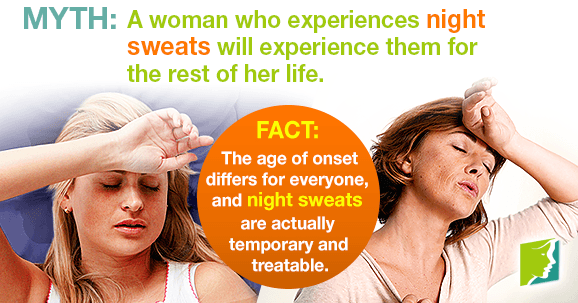Hot flashes and night sweats are two of the most common symptoms of the menopause transition. Being informed is half the battle when it comes to these uncomfortable side effects. Arm yourself with the truth behind the many myths associated with these heated symptoms of menopause.
MYTH: Everyone Who Experiences Hot Flashes Will Experience Night Sweats
Some women who experience hot flashes may never experience a night sweat, and vice versa. Diminished estrogen levels are a main reason why your body temperature is thrown off. Estrogen levels become low throughout the day during menopause, but at night become even lower. For this reason, many women who do not experience hot flashes will experience night sweats.
FACT: Time of Attack Differs for Everyone
Despite the greater decrease in estrogen overnight, statistically it is found that daytime hot flashes are still more common. This is because of the various triggers that women may inadvertently pull to set them off, triggers that differ for each woman.
While some women consume caffeine early in the morning, others may indulge in sweets at night. Some are more stressed in the afternoon at work, and some feel most stressed when their alarm clock goes off. Some women get them in elevators at noon, and others under the covers at midnight. It depends on each women's lifestyle as to when these causes will take effect.
MYTH: Hot Flashes and Night Sweats Will Experience Them for the Rest of Her Life
Although it may not seem like it, hot flashes really will go away. Many women experience hot flashes long before menopause, during perimenopause. Other women even experience them as a part of premenstrual syndrome (PMS), but even for them, they will cease. Whether affected in your 20s before your monthly period, or in your 50s in the heat of menopause, there is an end in sight.
FACT: They Are Actually Temporary and Treatable
Typically, when menopause hits, women will experience hot flashes for two to three years. Some women, however, can undergo hot flash and night sweat bursts for up to 10 years, but this is not usually the case. If hot flashes are getting you scorched during those dragging years, there are many safe remedies to cool you down.
MYTH: Hormone Replacement Therapy Is the Only Solution for Hot Flashes
Hormone replacement therapy (HRT) has been utilized for about 50 years for treating hot flashes, night sweats, and other menopause symptoms. However, recent studies find that HRT is strongly linked to ovarian, endometrial, and breast cancer and has no ability to protect you against heart attack or stroke, as is sometimes claimed. Many women are not taking HRT into consideration for these crucial reasons. There are alternative options that can also provide effective relief.
FACT: There Is an Abundance of Effective Natural Solutions
The reality is that you need assistance, and you need it quick. To boost your hormone levels, it makes sense to do the obvious - nourish yourself with phytoestrogen rich foods and herbs. Flax, soy, beans, nuts, licorice, red clover, and verbena all work like estrogen in the body and cool you down, but without such dangerous side effects.
Additionally, practice deep breathing, meditation, yoga, and 30 minutes of cardio to induce harmony in the body. This is important because stress is a major trigger for both night sweats and hot flashes.
Understand the reality behind your menopause symptoms, and learn how to take charge in a healthy and effective way. And remember - they will pass.
Sources
- American Cancer Society. (2013). Menopausal Hormone Therapy and Cancer Risk. Retrieved January 28, 2014, from http://www.cancer.org/cancer/cancercauses/othercarcinogens/medicaltreatments/menopausal-hormone-replacement-therapy-and-cancer-risk
- Breast Cancer.org. (2013). All About Hot Flashes. Retrieved January 31, 2014, from http://www.breastcancer.org/tips/menopausal/facing/hot_flashes




